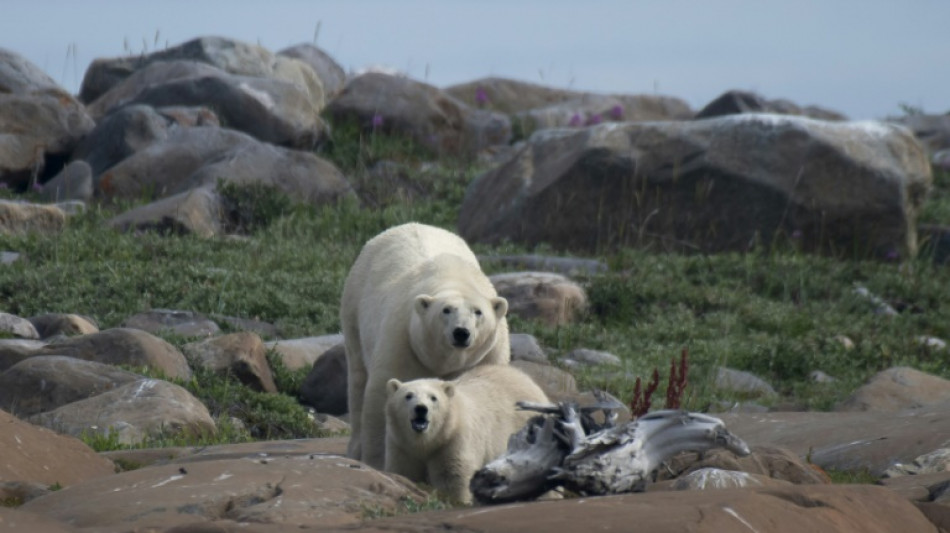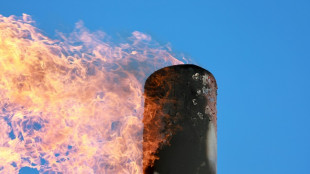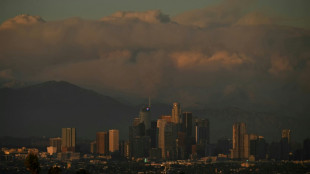
-
 Japan's Panasonic targets 10,000 job cuts worldwide
Japan's Panasonic targets 10,000 job cuts worldwide
-
Putin evokes WWII victory to rally Russia behind Ukraine offensive

-
 China exports beat forecasts ahead of US tariff talks
China exports beat forecasts ahead of US tariff talks
-
Leo XIV, the 'Latin Yankee', to celebrate first mass as pope

-
 Most stocks lifted by hopes for US-China talks after UK deal
Most stocks lifted by hopes for US-China talks after UK deal
-
IPL suspended indefinitely over India-Pakistan conflict: reports

-
 German lender Commerzbank's profits jump as it fends off UniCredit
German lender Commerzbank's profits jump as it fends off UniCredit
-
Rare bone-eroding disease ruining lives in Kenya's poorest county

-
 India says repulsed fresh Pakistan attacks as de-escalation efforts grow
India says repulsed fresh Pakistan attacks as de-escalation efforts grow
-
Zhao's historic snooker title sparks talk of China world domination

-
 'High expectations': EU looks to Merz for boost in tough times
'High expectations': EU looks to Merz for boost in tough times
-
Poisoned guests rarely invited before deadly mushroom lunch, Australia trial hears

-
 China sales to US slump even as exports beat forecasts
China sales to US slump even as exports beat forecasts
-
Indian cricket to make 'final decision' on IPL over Pakistan conflict

-
 Dethroned Bundesliga champions Leverkusen face uncertain future
Dethroned Bundesliga champions Leverkusen face uncertain future
-
China can play hardball at looming trade talks with US: analysts

-
 French monuments in trouble while PSG prepare for Champions League final
French monuments in trouble while PSG prepare for Champions League final
-
Newcastle face Chelsea in top five showdown, Alexander-Arnold in spotlight

-
 Flick's Barca must show 'hunger' in crunch Liga Clasico
Flick's Barca must show 'hunger' in crunch Liga Clasico
-
Clasico the last chance saloon for Ancelotti's Real Madrid

-
 Timberwolves overpower Warriors to level series
Timberwolves overpower Warriors to level series
-
Chinese fabric exporters anxious for US trade patch-up

-
 Putin gears up to host world leaders at lavish army parade
Putin gears up to host world leaders at lavish army parade
-
Nearing 100, Malaysian ex-PM Mahathir blasts 'old world' Trump

-
 Leo XIV, first US pope, to celebrate first mass as pontiff
Leo XIV, first US pope, to celebrate first mass as pontiff
-
Asian stocks lifted by hopes for US-China talks after UK deal

-
 Former head of crypto platform Celsius sentenced 12 years
Former head of crypto platform Celsius sentenced 12 years
-
Ex-model testifies in NY court that Weinstein assaulted her at 16

-
 Nestlé and OMP Showcase Approach to Future-Ready Supply Chain at Gartner Supply Chain Symposium/Xpo in Barcelona
Nestlé and OMP Showcase Approach to Future-Ready Supply Chain at Gartner Supply Chain Symposium/Xpo in Barcelona
-
Genflow Biosciences PLC Announces Share Subscription, Director's Dealing and Update

-
 Argo Blockchain PLC Announces 2024 Annual Results and Restoration of Listing
Argo Blockchain PLC Announces 2024 Annual Results and Restoration of Listing
-
'Great honor': world leaders welcome first US pope

-
 Pacquiao to un-retire and fight Barrios for welterweight title: report
Pacquiao to un-retire and fight Barrios for welterweight title: report
-
Trump unveils UK trade deal, first since tariff blitz

-
 Man Utd one step away from Europa League glory despite horror season
Man Utd one step away from Europa League glory despite horror season
-
Jeeno shines on greens to grab LPGA lead at Liberty National

-
 Mitchell fires PGA career-low 61 to grab Truist lead
Mitchell fires PGA career-low 61 to grab Truist lead
-
AI tool uses selfies to predict biological age and cancer survival

-
 Extremely online new pope unafraid to talk politics
Extremely online new pope unafraid to talk politics
-
Postecoglou hits back as Spurs reach Europa League final

-
 Chelsea ease into Conference League final against Betis
Chelsea ease into Conference League final against Betis
-
Pope Leo XIV: Soft-spoken American spent decades amid poor in Peru

-
 First US pope shared articles critical of Trump, Vance
First US pope shared articles critical of Trump, Vance
-
'Inexcusable' - NBA champs Boston in trouble after letting big leads slip

-
 US automakers blast Trump's UK trade deal
US automakers blast Trump's UK trade deal
-
Stocks mostly rise as US-UK unveil trade deal

-
 Trump presses Russia for unconditional 30-day Ukraine ceasefire
Trump presses Russia for unconditional 30-day Ukraine ceasefire
-
Anything but Europa League glory 'means nothing' for Man Utd: Amorim

-
 'Inexcuseable' - NBA champs Boston in trouble after letting big leads slip
'Inexcuseable' - NBA champs Boston in trouble after letting big leads slip
-
Pope Leo 'fell in love with Peru'and ceviche: Peru bishop


Polar bears struggling to adapt to longer ice-free Arctic periods
Polar bears in Canada's Hudson Bay risk starvation as climate change lengthens periods without Arctic Sea ice, despite the creatures' willingness to expand their diets.
Polar bears use the ice that stretches across the ocean surface in the Arctic during colder months to help them access their main source of prey -- fatty ringed and bearded seals.
In the warmer months when the sea ice recedes, they would be expected to conserve their energy and even enter a hibernation-like state.
But human caused climate change is extending this ice-free period in parts of the Arctic -- which is warming between two and four times faster than the rest of the world -- and forcing the polar bears to spend more and more time on land.
New research looking at 20 polar bears in Hudson Bay suggests that without sea ice they still try to find food.
"Polar bears are creative, they're ingenious, you know, they will search the landscape for ways to try to survive and find food resources to compensate their energy demands if they're motivated," Anthony Pango, a research wildlife biologist with the US Geological Survey and lead author of the study, told AFP.
The research, published in the journal Nature Communications, used video camera GPS collars to track the polar bears for three-week periods over the course of three years in the western Hudson Bay, where the ice-free period has increased by three weeks from 1979–2015, meaning that in the last decade bears were on land for approximately 130 days.
The researchers found that of the group, two bears indeed rested and reduced their total energy expenditure to levels similar to hibernation, but the 18 others stayed active.
The study said these active bears may have been pushed to continue to look for food, with individual animals documented eating a variety of foods including grasses, berries, a gull, a rodent and a seal carcass.
Three ventured off on long swims -- one travelled a total distance of 175 kilometres (more than a hundred miles) -- while other bears spent time playing together or gnawing on caribou antlers, which researchers said was like the way dogs might chew bones.
But ultimately the researchers found that the bears' efforts to find sustenance on land did not provide them with enough calories to match their normal marine mammal prey.
Nineteen out of the 20 polar bears studied lost weight during the period consistent with the amount of weight they would lose during a period of fasting, researchers said.
That means that the longer polar bears spend on land, the higher their risk for starvation.
- Cause for alarm -
"These findings really support the existing body of research that's out there, and this is another piece of evidence that really raises that alarm," Melanie Lancaster, senior Arctic species specialist for the World Wildlife Fund, who is not associated with the study, told AFP.
The world's 25,000 polar bears remaining in the wild are endangered primarily by climate change.
Limiting planet-warming greenhouse gases and keeping global warming under the Paris deal target of 1.5 degrees Celsius above pre-industrial levels would likely preserve polar bear populations, Pango said.
But global temperatures -- already at 1.2C -- continue to rise and sea ice dwindles.
John Whiteman, the chief research scientist at Polar Bears International, who was not involved in the study, said the research was valuable because it directly measures the polar bears' energy expenditure during the ice-free periods.
"As ice goes, the polar bears go, and there is no other solution other than stopping ice loss. That is the only solution," he told AFP.
M.Thompson--AMWN


